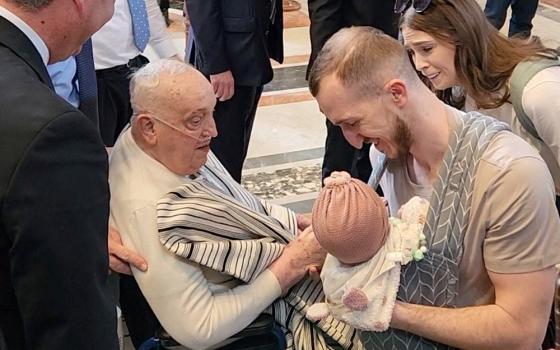Pope Francis and Nasaruddin Umar, grand imam of the Istiqlal Mosque, pose for a photo at the conclusion of an interreligious meeting in Jakarta, Indonesia, on Sept. 5. (CNS/Lola Gomez)
Muslims around the world are among the well-wishers expressing gratitude as Pope Francis recovers at his Vatican home after a monthlong hospitalization from double pneumonia.
Sheikh Ahmed al-Tayeb, the grand imam of Al-Azhar University in Cairo and a global Sunni leader, wrote on his social media: "I pray to Allah to grant my dear brother, Pope Francis, a swift recovery and to bless him with good health and well-being so that he may continue his journey in serving humanity."
The grand imam and the pope are friends, having collaborated on the groundbreaking "Document on Human Fraternity for World Peace and Living Together" in 2019. The two have met several times and stay in frequent contact, supporting one another in quiet, unpublicized ways. When the grand imam's sister died a few years ago, the first phone call of condolence he received was from Francis.
This anecdote and others like it are recounted by Mohamed Abdel Salam, a former assistant to the grand imam, in his book The Pope and the Grand Imam: A Thorny Path, which chronicles the relationship between Francis and al-Tayeb and their work together. Abdel Salam is himself a friend of the pope's — one year, Francis celebrated his own birthday with Abdel Salam's children when they were visiting the Vatican.
Abdel Salam posted on Instagram in Arabic and English, "Heartfelt prayers and best wishes for the swift recovery of His Holiness. … May he soon return to his beloved followers to continue his journey of peace and human fraternity."
Pope Francis and Egyptian Sheikh Ahmad el-Tayeb, grand imam of Al-Azhar, attend a meeting with other religious and political leaders in front of the Colosseum in Rome Oct. 7, 2021. The meeting was held to plead and pray for peace. (CNS/Paul Haring)
While the pope was hospitalized, Nour Essa, a Muslim woman from Damascus, Syria, checked the news every day for his health update. Nour, along with her husband, son and father-in-law, were one of three Syrian refugee families that Francis met in Lesbos, Greece, and helped resettle in Italy. In a recent interview at their apartment in Rome, she recalled their meeting: "What shocked me the most is that the father of the church was a modest man, who didn't have prejudices, open toward other ethnicities and religion." Her husband, Hasan Zaheda, called the pope "a gift from paradise … a gift from our God, that God sent us to save us."
In Jakarta, Indonesia, Nasaruddin Umar, the minister of Religious Affairs, invited his fellow Muslims to pray for the pope. "May he recover quickly," he said to those assembled at the Istiqlal Mosque, where he also serves as the imam.
Francis visited Umar and the mosque in 2024, where they signed a joint declaration on the global problems of dehumanization and environmental degradation. They traveled together through the new Tunnel of Friendship, which connects the mosque to the neighboring Catholic church.
In my own circles, Muslims were also expressing their prayers for the pope while he was ill. Alongside a photo of Francis smiling, Cenap Aydin posted on Facebook: "Praying for Pope Francis! Wish him a speedy recovery." Aydin is a scholar of interfaith relations in Rome, where he works as the vice secretary general of Istituto Internazionale Jacques Maritain, the Catholic philosopher and humanist.
On Facebook I also saw a post from Safi Kaskas, an American Muslim businessman of Lebanese background who spent many years in Saudi Arabia. He and a Christian friend, the late David Hungerford, once collaborated on the book The Qur'an with References to the Bible: A Contemporary Understanding. Kaskas gave a copy of the book to Pope Francis in 2016 upon meeting him in Rome. Kaskas posted a photo of their encounter on his Facebook page, writing in detail about the pope's medical condition.
"The reason I'm sharing this with you is because when I met him I was very impressed with his humility," he wrote. "After I gave him my book The Qur'an with References to the Bible, he stood there going through it for several minutes. Obviously, he was interested and impressed, he then turned to me and said pray for me."
Advertisement
Upon Francis' recovery, Kareem Irfan, the co-chair of the National Catholic-Muslim Dialogue, run in part by the U.S. Conference of Catholic Bishops' Secretariat for Ecumenical and Interreligious Dialogue, sent a message to Catholic members of our group, to which I belong. "It's heartening to hear about the good progress on the health and recovery of the Holy Father at the Vatican," he said, signing off with a clapping hands emoji.
I also received a personal email from a Muslim individual I met recently. Sabir Rahman has held leadership roles for many years at the Muslim Community Center, a major mosque in Silver Spring, Maryland which houses, in addition to a vast prayer hall and community center, a food pantry and free medical clinic. Earlier this year, the mosque's interfaith committee had invited me to speak at an event with the congregation's imam, Mohamed Abdullahi, and Sabir served as the moderator for our dialogue. He wrote to me, "I have been following the news of the Pope's illness with prayerful concerns and sadness. Now that he has recovered, it is so wonderful. God is good."
Pope Francis is no doubt grateful for these prayers from both his Muslim friends and those around the world. Throughout his papacy, Francis has asked Muslims (and people of other faiths) to pray for him. The pope recognizes that Muslims "together with us, adore the One, Merciful God," to quote the teaching expressed at Vatican II and reiterated in the catechism. Now that the pope is recuperating at home, Catholics and Muslims are letting out a sigh of relief and lifting up continued prayers for his health.


